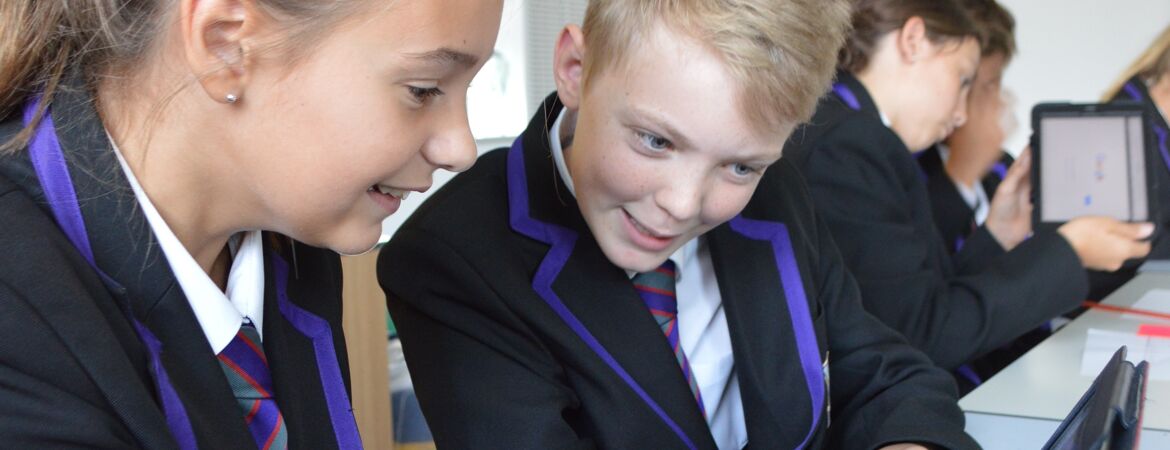English
The English curriculum at Trinity is set to enrich the students’ love of Language and Literature. They will be exposed to a range of books and will be encouraged to read for pleasure. We study a range of texts and poetry for Literature, as well as teach the students ways of expanding on their imaginations for Language. Our goal is to enable students to be fluent writers, readers, thinkers and communicators. We aim for them to be able to write coherently, in a range of tones and using a wide range of vocabulary.
Students will consistently return to key concepts and skills in each year that they are here with us at Trinity. The English curriculum is a full one but is one that will equip them with the writing skills they need in the wider world, whether that is writing a letter, using an array of vocabulary in their everyday lives or communicating effectively in different contexts.
By the end of year 9 students will be able to develop a thesis statement to engage with essay based responses and provide detailed effects of methods. They will also be able to have solid analysis of language, structure and form using subject terminology. Students will be able to use register, tone and formality appropriately. They will have varied use of structural features for effect whilst using paragraphs coherently. They will be able to use a full range of linguistic devices and sophisticated vocabulary in their own writing.
For GCSE English Literature, students study An Inspector Calls, Macbeth, A Christmas Carol and the AQA poetry anthology in the theme of Power and Conflict. Studying this variety encompasses many key skills that will enable students to become eloquent and effective readers and writers, as well as opens their eyes to Literature from different time periods.
For GCSE English Language, students will study the way that words, punctuation and the structure of a text can affect the way that readers feel and respond to them. They will also learn how to craft thought-provoking pieces of writing that aim to showcase their blossoming authorial skills.
By the end of year 11 students will be able to write clear, concise and analytical responses to both Literature and Language style questions. They will be familiar with the GCSE examination format and the skills required to succeed. They will be able to work independently and constructively to consolidate their learning from the past two years. Key skills will include being able to interpret and critically evaluate texts. They will be able to take the initiative to effectively proofread and improve their work where necessary.
At Trinity, we offer the chance to study English Literature A-Level (AQA Literature B). This rigorous course is comprised of three strands: Aspects of Tragedy, Political and Social Protest Writing, and a Non-Examined Assessment. Across these strands, students discover for themselves the rich and provocative landscape of literary texts. Articulation, essay writing and critical thinking, are just three of the skills that students will be challenged to develop. A love of reading, and an openness to new ideas is essential for success in English Literature at A-Level.
SEND and English at Trinity
At Trinity It is an expectation that all lessons and wider resourcing has effective provision for students with SEND so that they are able to make equal progress to their peers. SEND data is analysed and used to inform planning and interventions where necessary.
In English all teachers consider the needs of SEND students in three ways.
Firstly English teachers consider a ‘seating check’ This means that students needs are taken into account when devising seating plans in classrooms and in the Library (for reading lessons).
Secondly all resources are checked to ensure they are SEND friendly. In English this means that backgrounds are a plain, pale colour; dual coding is regularly used when teaching key concepts in a text; and instructions and extended texts are chunked across several slides to avoid cognitive overload.
Finally, the way English is implemented is at Trinity ensures all SEND students can make progress. This means that questioning and recall is used to check understanding. This also extends thinking and provides challenge. We also use the “I do, we do, you do” process, to blend instruction, live modelling and independent practise in a supportive way. In English we also use writing scaffolds, such as PETE and PETAZL to scaffold students’ analytical writing, as they progress through the key stages. Finally, vocabulary is pre-taught to ensure that all students can engage with comprehension and analysis tasks that link to the curriculum.


